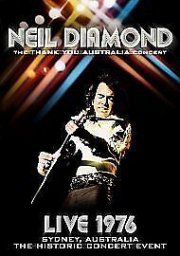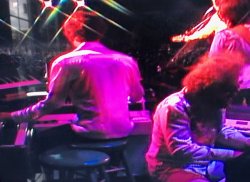


 |
 |
 |
Well, it's taken me a while, but I've finally taken the plunge and reviewed my first DVD. More to follow, although anything by artists with their own reviews page will be found there.
| Neil Diamond | Mellodrama |
 |
The Thank You Australia Concert Live 1976 |
|
| Missa Soolaimon Play Me Solitary Man Cherry Cherry Sweet Caroline The Last Picasso Longfellow Serenade Song Sung Blue Cracklin' Rosie Holly Holy I am, I Said |
Anthem Be Dear Father Skybird Lonely Looking Sky Anthem (Reprise) Be (Reprise) Brother Love's Traveling Salvation Show I've Been This Way Before [Bonus feature: Extra Concert Footage of Morningside] |
|
My old pal Gary's written a few words about this DVD. I'll try to squeeze a rating out of him sometime.
This DVD saw the last leg of Neil Diamond's concerts, covering New Zealand and Australia, which finished at the Sydney Sports Ground on 9th March 1976 to a crowd of 39,000 people. This was to be broadcast live; apart from the main concert the DVD covers the usual bonus features, one being Morningside. Why would you make this an extra, why not just leave it in the main concert?
The concert starts with Neil backstage waiting to go on. As usual in the 70's the clothes he wears are a very bright yellow shirt (which would give a hi-viz vest a run for its money) and tight brown leather trousers, with the usual encrusted jewels on the belt and shirt. There are only seven band members and a lady backing singer; quite a small ensemble, with no string or horn section, which you would normally associate with Neil Diamond songs.
I'm only concentrating on the keyboard players, of which the band has two: Tom Hensley on piano/electric piano and Alan Lindgren on Hammond B3, Mellotron, Moog and string synth, with the Mellotron taking over the string, flute and cello parts, those being a normal set of tapes for the '70s.
The non-mellotron tracks are:
Soolaimon
Solitary Man
Cherry Cherry
I am, I said
Brother Love's Traveling Salvation Show
Running through the Mellotron tracks:
Play Me: strings
Sweet Caroline: strings
The Last Picasso: strings/flute
Longfellow Serenade: strings
 |
With his in between song chatting, he mentions how listening to Mozart helped him write Song Sung Blue. He then turns to Alan Lindgren to play some classical Mozart which he does with some decent Mellotron playing, following into:
Song Sung Blue: strings
Cracklin' Rosie: strings
Holly Holy: strings
During the above song there's a glimpse behind the keys where you can clearly see a white M400 (right).
The main part of the concert is Anthem (Jonathan Livingstone Seagull), which blends one song into another, a bit like a mini rock opera.
Anthem: strings
Be: strings
Dear Father: cello
Skybird: strings
Lovely Looking Sky: strings
Anthem (Reprise): strings
Be (Reprise): strings
I've Been This Way Before: cello/strings
Bonus Track: Morningside: strings
So overall, not a bad concert with sixteen of the twenty-one tracks containing Mellotron, highlights being Anthem and I've Been This Way Before. The Band's twenty-one tracks are well rehearsed and Lindgren's playing is decent throughout, with upfront strings on these tracks. Also, the Mellotron is sounding on form, with no slipping or wobbly notes. The sound and vision quality are not bad considering the age. So, as Andy would probably say, if you like Neil Diamond and the Mellotron, this will be a good one to look at.
| Gary Knight |
 |
Mellodrama: The Mellotron Movie (2009, 80.00) ****Main featureBonus shorts |
Current availability:
Dianna Dilworth has the faintly dubious honour of being the first (and last?) person to actually tackle the idea of a film about the Mellotron, the end result, Mellodrama: The Mellotron Movie, achieving a low-key release in the summer of 2009. I saw it in an almost empty viewing room at a tiny film festival in London, during which the projector broke down and people came and went, making it a far from perfect viewing experience. The DVD was released at the end of the year, nicely packaged, with a selection of bonus clips and while watching it at home doesn't have quite the same atmosphere as a West London arts centre on one of the hottest days of the year, my player didn't conk out and no-one walked in front of me while I was watching.
So; what's it actually like, then? Well, it tells the essentially chronological story of the Chamberlin and the Mellotron, with a distinctly American bias; in fairness, both the Chamberlin and Dilworth herself are American, but given that it's a film about an instrument that's generally regarded as British, there are surprisingly few UK contributors. However, Dilworth has tracked down a good selection of interviewees, I have to say, including Richard 'son of Harry' Chamberlin, whose insight into the birth of the tape-replay concept is invaluable, plus a handful of Brits who were in at the beginning, not least the eminently interviewable Geoff Unwin, Mellotronics' demonstrator in the '60s. Dilworth's other main ports of call are Sweden and Italy, where she speaks to Markus Resch (manufacturer of the MkVI) and various musicians, not least my old friend Mattias Olsson of Änglagård and ex-members of Goblin. The film features loads of clips of historical interest and tells the entwined instruments' stories with considerable accuracy, while keeping what could so easily be a dull subject to a non-devotee as interesting as possible.
Other chief interviewees include Dave Kean, who first resurrected the machine at the end of the '80s and stacks of relevant musicians/producers, including Michael Penn, Patrick Warren, Jon Brion, Brian Kehew (Moog Cookbook), Mike Pinder, Ian McDonald and, amazingly, Tony Banks, who seems quite happy to chat about a machine he's notorious for loathing. There's some priceless footage of Brian Wilson plonking away on Kehew's purple M400, plus two of the guys from Bigelf's amusing reminiscences and the inimitable Rick Neilson from Cheap Trick, talking about his early days in Fuse. On the downside, although samples need to be mentioned, do we really need to listen to the Opeth guys talking about how great Clavia's Nord Mellotron samples are?
I feel I have to point out the film's failings, to give a balanced account. Technically, I wouldn't say it was well-shot; several scenes include what appears to be 'preparatory' camera work, cross-fading only appears towards the end of the film and on the bonus clips, while sound levels vary, as do amounts of background noise. I realise that interviewing people in the open air (as some were) can be fraught with problems, but I'd have though these could be ironed out in the editing suite. I'm sure the whole thing's been made on a budget, though, since I can't imagine anyone pumping huge amounts of money into the project, so these are relatively minor quibbles. One huge omission, however, seems to be the lack of any real mention of the British operation, Streetly Electronics, although I believe Martin and John chose not to be interviewed. While Streetly's name appears on screen a couple of times, I think a verbal mention of their existence wouldn't have gone amiss. My other complaint is on the accuracy front: misspellings are endemic (Geoff Unwinn?) and the rolling lists of Mellotron/Chamby tracks across the years contain several sample-employing albums/tracks, which really isn't the same thing, is it? There are many major names not here, but that's probably more due to their disinterest in participating than any deliberate omission on Dilworth's part, so we can hardly hold that against her.
All in all, then, anyone with more than a passing interest in the tape-replay concept should enjoy Mellodrama, although how often you might want to watch it is another matter, but then, you could probably say the same for most documentaries. One downside is that the DVD isn't cheap, but at least you get an expensively-packaged set in a digipack with a small book, rather than the kind of half-arsed efforts some companies release. Whether Dilworth (or whoever stumped up the cash) will even recoup their investment is a moot point, but at least someone's made this film while a few of the original players (of both kinds) are still alive. Imperfect, but not only is it all we have, but the insight it gives into the development, the rise, fall and partial rise again of the Chamberlin and Mellotron make this essential viewing. Cautiously recommended.
Incidentally, Diana has released a CD of the incidental music from the film, reviewed here.
See: Mellodrama | Michael Penn | Bigelf | Jon Brion | Mike Pinder | Ian McDonald | Tony Banks | Opeth